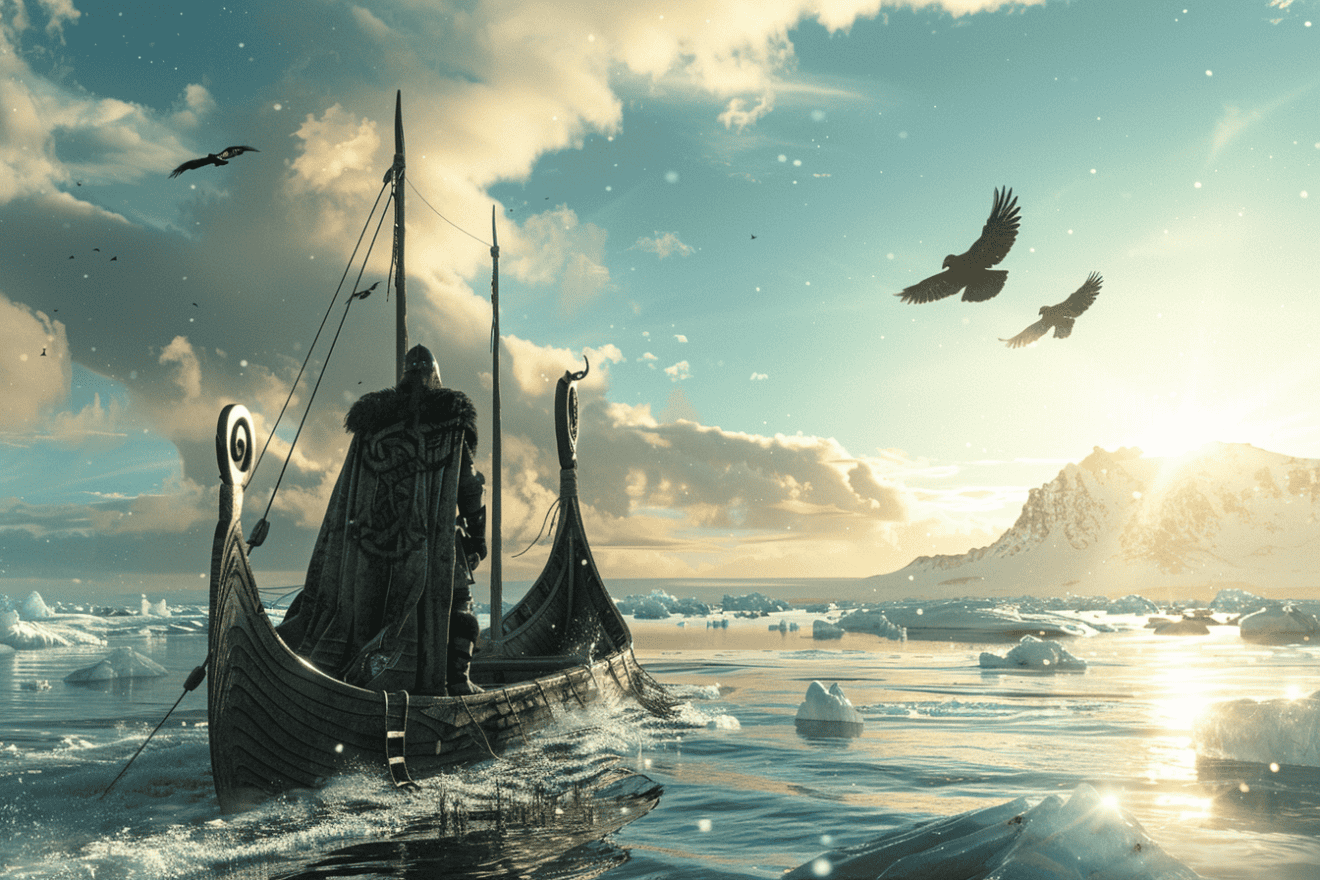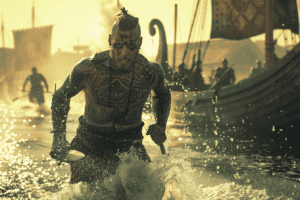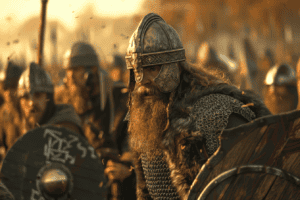As the Vikings’ tales of Thule, a mystical land of eternal sunshine, fueled his imagination, Hrafna-Floki Vilgerðarson, or Floki, set his sights on an uncharted island in the far-off horizon.
The late 9th-century Viking explorer, driven by a restless determination, boldly charted a course for the unknown, braving the treacherous North Atlantic seas and unpredictable weather conditions.
What drove Floki to take such a perilous journey, and what secrets did he uncover in this unforgiving landscape?
The answer lies in the rugged shores of Iceland, where his pioneering spirit marked a significant milestone in Norse exploration.
Early Life and Inspirations

Floki Vilgerðarson, born in the late 9th century, grew up in a Norway ravaged by war and Viking raids, which presumably sparked his desire for adventure and discovery. This tumultuous environment likely shaped his ambitious and fearless nature, traits that would serve him well in his future endeavors.
As a young man, Floki was fascinated by the stories of his Viking ancestors, who sailed across the seas and explored unknown lands. He was particularly drawn to the tales of the mythical island of Thule, a fabled land of abundance and promise. These stories fueled his imagination and ignited a sense of restlessness, driving him to seek out new horizons.
Floki’s early life in Norway laid the foundation for his future exploits, instilling in him a sense of determination and resilience that would allow him to overcome the challenges he’d face on his journey. His experiences in Norway would ultimately shape his destiny, paving the way for his historic voyage to Iceland.
The Journey to Iceland

With a sense of restless determination burning within him, he set out to chart a new path, driven by the tales of his ancestors and the myths of Thule.
Hrafna-Floki Vilgerðarson’s journey to Iceland was a calculated risk, fueled by his curiosity about the unknown lands to the west. He assembled a crew of seasoned sailors and set sail from the Norwegian coast, exploring the treacherous waters of the North Atlantic.
Floki’s three ships followed the familiar route of the Viking trade routes, but he was determined to push beyond the known boundaries. As they sailed, they encountered the vast expanse of the Atlantic, with its unpredictable storms and currents.
Despite the challenges, Floki’s crew remained resolute, driven by their leader’s unwavering resolve. After weeks at sea, they finally spotted the snow-capped peaks of Iceland’s mountains, a tribute to the land’s unforgiving beauty.
With a sense of triumph, Floki and his crew dropped anchor in the sheltered bay of Reykjavík, marking the beginning of a new chapter in Icelandic history.
Challenges and Obstacles

Three long, grueling months at sea had taken their toll on the crew, as they battled against the relentless fury of the North Atlantic storms. The harsh weather conditions, coupled with the limited provisions and primitive navigation tools, made their journey even more perilous.
Floki’s crew had to contend with the constant threat of shipwrecks, and the ever-present risk of mutiny. The crew’s morale was low, and their bodies were weakened by the scarcity of food and water.
As they navigated through the treacherous waters, they encountered massive icebergs and hidden shoals, which threatened to destroy their ships. The Vikings’ primitive sailing technology made them vulnerable to the unpredictable weather patterns, and they’d to rely on their instincts and experience to navigate the treacherous waters.
Despite these challenges, Floki’s crew persevered, driven by their leader’s determination to reach the unknown land.
Legacy of a Viking Explorer

Hrafna-Floki’s daring journey to Iceland marked the start of a new era in Norse exploration, cementing his legacy as a pioneering Viking explorer. His bold expedition paved the way for future generations of Norse seafarers, inspiring them to map out new territories and expand their reach. Floki’s achievement not only solidified his reputation as a skilled navigator but also earned him a place among the most revered Viking explorers.
Floki’s legacy extends beyond his discovery of Iceland. He’s credited with giving the island its name, which translates to ‘Land of Ice‘ in Old Norse. His descriptions of the island’s harsh climate and geographical features helped shape the understanding of the Viking world. Furthermore, Floki’s journey sparked a wave of Norse settlement in Iceland, establishing the island as a crucial hub for trade, culture, and exploration.
As a symbol of his enduring legacy, Floki’s name has become synonymous with bravery, innovation, and discovery. His remarkable journey continues to captivate historians and enthusiasts alike, serving as a strong reminder of the Vikings’ unwavering spirit of exploration and adventure.
Impact on Icelandic History

Floki’s settlement of Iceland around 870 CE set in motion a chain of events that would shape the island’s history, culture, and identity. His expedition marked the beginning of a significant influx of Viking settlers, who’d go on to establish the first permanent Icelandic settlements. Over time, these settlers developed a distinct cultural identity, shaped by their Norse heritage and the harsh, unforgiving environment of the island. The Icelandic Commonwealth, established in 930 CE, was a direct result of Floki’s pioneering efforts. This medieval society, which lasted for over three centuries, was characterized by a unique system of government, law, and social organization.
Floki’s impact on Icelandic history extends beyond the domain of politics and governance. He also played a vital role in shaping the island’s literary and linguistic heritage. The medieval Icelandic Sagas, which tell the stories of the island’s early settlers and their struggles, are a tribute to the enduring legacy of Floki’s expedition. These works, written in the 12th to 14th centuries, provide a unique window into the lives and experiences of Iceland’s early inhabitants, and continue to be celebrated and studied by scholars around the world.










Add Comment